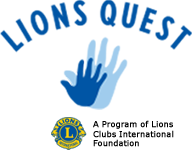Lions Quest

Skills For Adolescence – A Value-based Educative Initiative
To promote positive youth development, this programme was started in 1975 by Mr. Rick Little. Lions Club International Foundation (LCIF) took over completely in 2002. The programme aims –
1) Skills for Growing
2) Skills for adolescence,
3) Skills for Actions.
Skills for Adolescence encourages the young pupils aged 12-14 to say ‘NO’ to alcohol, tobacco and other drugs by emphasizing good judgement, responsibility and goal setting.
Skill for growing is a value based education for pupils up to the age of nine or ten who are trained to learn effective thinking and social skills that lead to positive behaviour and strong character. Emphasis is placed on the role of family, school, and community in the development of a child’s decision-making process.
Skills for action are the personal and social responsibility of the youth, aged between 15 and 19, are the focal points of the programme. By taking part in service-learning projects, participants learn life skills that include interpersonal communication, co-operation, proactive learning and thoughtful citizenship.
Lions Quest- Benefits
- Our youth benefit by developing life skills, learning to say ‘NO’ to drugs, alcohol and violence and ‘Yes’ to community service and volunteering.
- Schools benefit by the creation of a healthy atmosphere.
- Community benefits by the assurance of a better generation.
- Lions benefit by the possibility of the next generation of potential Lion members.
Lions Quest- Programme
- By appointing a Club Committee Chairperson for Lions Quest to promote and oversee the programme on a long-term basis.
- By adopting the LQ Programme as a permanent activity of the club to be continued year after year.
- By creating an awareness among the correspondents and heads of schools in their operational area about Lions Quest.
- By motivating them to send at least two teachers every year to the LQ. workshop to be trained in LQ. curricular. If necessary, the club must sponsor the trainees.
- If necessary, by purchasing and presenting the pupils’ books on Lions Quest.
- By making them allot at least two periods of 45 minutes every week in their classes for L.Q. education.
- By motivating the Club Committee Chairperson for L.Q. to visit the schools regularly and maintain a close follow-up.
- By sending the Club Committee Chairperson to speak at a Lions Quest class.
- By providing annual funding for LQ programmes.
- By planning and conducting joint service projects with LQ pupils.
- By co-hosting semi-annual Lions Quest Orientation Meetings for parents.
- By widely publicizing the LQ programmes.
